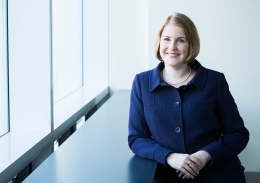How a Master of Commerce in Management Accounting can fast-track your CIMA accreditation
Karthik Venkatesh discovered how, with recognition from the Chartered Institute of Management Accountants (CIMA), he was set for success.
Karthik Venkatesh discovered how, with recognition from the Chartered Institute of Management Accountants (CIMA), he was set for success.

After completing his Bachelor of Economics, Karthik Venkatesh expected he would follow a traditional accounting path. He envisaged himself joining one of the ‘Big 4’ in a graduate program and becoming a Chartered Accountant. But when the global financial crisis hit, the news coverage on the financial markets intrigued Karthik and he decided to join investment management company, Challenger.
“After being exposed to the investment side and the process of investing in well-run companies, I wanted to cross over and work in the commercial side of a business,” Karthik says.

Karthik Venkatesh
The economics graduate spent some time in Canada where he found out about management accounting and the Chartered Global Management Accountant (CGMA) qualification provided by the Chartered Institute of Management Accountants (CIMA).
“Reading deeper into it, I realised this is exactly what I wanted to learn about and reignite my career in,” he says.
The Master of Commerce (Management Accounting) program was purpose-designed at UNSW to enable graduates to accelerate their career in management accounting by achieving recognition with CIMA.
A CIMA qualification sends a clear signal to potential employers that graduates can make a value-driven contribution to their organisation.
“In the core Master’s level program, studies cover topics examined at the operational level of CIMA’s syllabus; and if students complete our extension program, they can also cover topics at the strategic level of the syllabus,” says Associate Professor Kerry Humphreys from the School of Accounting at UNSW Business School.
“This can mean graduates only have one CIMA exam to complete, and so provides them with a fast-track for attaining a CIMA qualification.”
The CGMA competency framework encompasses four knowledge areas that build skillsets related to technique, leadership, business and people management. The skillsets are then complemented by studies that develop ethics, integrity and professionalism.

Kerry Humphreys
“The competency framework ensures graduates develop a comprehensive skillset across these key areas,” Kerry says. “For employers, this means not only do CGMAs bring a high level of technical skill and proficiency, but they also become successful business partners and team leaders who consistently add value in their interactions.”
For Karthik, completing a course with accreditation from CIMA is very important.
“It shows your commitment to the industry and employers that you have studied and gained competence in many facets of financial and strategic accounting that you are then able to translate in the real world,” he says.
“CIMA is a globally recognised qualification that opens many doors whether it be in different industries or different geographical locations.”
UNSW’s decision to incorporate the CIMA framework into the MCom (Management Accounting) is something to be applauded, says Karthik.
“With many large businesses offshoring reporting and other accounting functions, management accounting is an area which will only grow in importance as the ability to decipher big data and translate it into business decisions becomes a critical skill,” he says.
“CIMA is driving these skills through this qualification,” Karthik says. He sees CIMA’s partnership with UNSW Business School to promote management accounting as being “fundamental to the development of the accounting industry and the part that accountants can play in organisations.”
Choose the CIMA-accredited specialisation to transform your career.